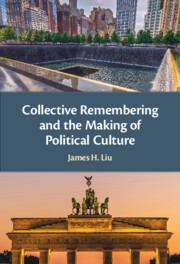Book contents
- Collective Remembering and the Making of Political Culture
- Collective Remembering and the Making of Political Culture
- Copyright page
- Contents
- Preface
- Part I Introduction to Collective Remembering
- Part II Developing a Theoretical Approach to Collective Remembering
- Part III Idiographic Case Studies of Collective Remembering
- Chapter 8 China and the United States of America
- Chapter 9 Colonization and Decolonization in Israel-Palestine and Aotearoa-New Zealand
- Chapter 10 The COVID-19 Pandemic and the Reciprocal Relationship between Past, Present, and Future
- References
- Index
Chapter 8 - China and the United States of America
Going beyond the Thucydides Trap
from Part III - Idiographic Case Studies of Collective Remembering
Published online by Cambridge University Press: 04 August 2022
- Collective Remembering and the Making of Political Culture
- Collective Remembering and the Making of Political Culture
- Copyright page
- Contents
- Preface
- Part I Introduction to Collective Remembering
- Part II Developing a Theoretical Approach to Collective Remembering
- Part III Idiographic Case Studies of Collective Remembering
- Chapter 8 China and the United States of America
- Chapter 9 Colonization and Decolonization in Israel-Palestine and Aotearoa-New Zealand
- Chapter 10 The COVID-19 Pandemic and the Reciprocal Relationship between Past, Present, and Future
- References
- Index
Summary
The reason he projects such an “unthinkable” future, where in the worst case, two nuclear-armed superpowers enter into a war that ends civilization, is the Thucydides Trap. According to Allison (2017), going back to the Peloponnesian War Thucydides wrote about, that brought about the end of the golden era of Greek civilization 2,500 years ago, twelve out of sixteen cases when a rising power faced a ruling power in relative decline resolved themselves through war. The “natural, inevitable discombobulation that occurs when a rising power threatens to displace a ruling power” leads to feelings of frustration in the rising power that the ruling power is preventing them from achieving their rightful place in the world, and in the ruling power gives rise to feelings of threat that the rising power will upset their existing way of life. If these subjective perceptions, rooted in aspects of the objective situation, are not managed well, the situation will resolve itself through warfare. In the time of Thucydides, this resulted in disaster for both Athens (the defeated) and Sparta (the victor). In the time of the twentieth century, this resulted in calamity for Germany, and the end of empire for Great Britain. In the time of the twenty-first century, this could spell disaster for human civilization. Widespread understanding of the history and identity of the People’s Republic of China (PRC) and the USA is a form of inoculation against such a possible future. Because so much of this book has reported on American collective remembering, this chapter focuses more on Chinese collective memory, and how it informs a global understanding of China.
- Type
- Chapter
- Information
- Collective Remembering and the Making of Political Culture , pp. 163 - 186Publisher: Cambridge University PressPrint publication year: 2022



